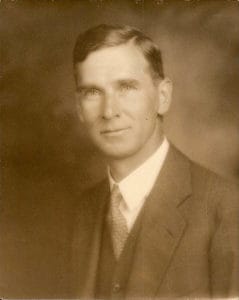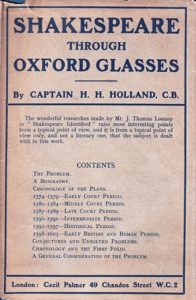By the SOF Data Preservation Committee

The New England Shakespeare Oxford Library (NESOL) in Somerville, Massachusetts, has acquired the research books and papers of early American Oxfordian Charles de Vere Drayton (1882-1960). Not only was Drayton a friend of Charlton Ogburn Jr. and an early member of the Ereved Foundation (precursor to the SOF), he was also a descendent of Aubrey de Vere of the Battle of Hastings fame and Aubrey de Vere III, the 1st Earl of Oxford. Members of the de Vere Drayton family left England in 1675 to seek their fortune in Barbados, then considered the land of plenty. Ultimately the family migrated to Charleston, South Carolina, and built Drayton Hall, the home of seven generations of Draytons, until 1973, when if become part of the National Trust for Historic Preservation.
NESOL curator Bill Boyle was pleased to receive Drayton’s 30 research books, some written by those early Oxfordian “giants” that James Warren resurrected in Shakespeare Revolutionized. One treasured volume is Capt. H. H. Holland’s Shakespeare through Oxford Glasses (1923), a biographical sketch of the Earl of Oxford and the third Oxfordian book ever written. According to Boyle, “The rare dust cover on [this book], with its ads for other authorship books on the back cover and its significant and enthusiastic comments under some of the titles, proves that there was active interest in the Oxfordian movement in the years directly following the 1920 publication of “Shakespeare” Identified.”
Two other Drayton acquisitions, published in the 1850s, are by Reverend Alexander Dyce, a Scottish Shakespearean scholar and dramatic editor. Dyce’s personal library, which included editions of Robert Greene, Francis Beaumont, and John Fletcher, is now housed in London’s Victoria and Albert Museum.

Drayton’s papers, circa 1950s, reflect on Stratfordian thinking in the last 100 years, and unfortunately, remind us that not much has changed since then. In a 56-page missive entitled “The Mystery of ‘Shakespeare,’” Drayton muses, “We must deal with probabilities. The reasoning human mind cannot complacently accept the impossible. No one who earnestly desires to know the truth will impugn the good faith of those who prefer the probable to the impossible in a search for truth.”
Following the Folger Library’s March 1956 report on the authorship controversy, which lambasted doubters as, “naïve … snobs [who are] ignorant of life … in the Elizabethan period,” Drayton stepped into action. To that single page of condescension, he appended three pages of closely reasoned rebuttal, concluding that, “. . . one can hardly argue so preposterous a point with an adversary who displays such ignorance of the works.” We can only speculate on whether Drayton forwarded his refutation to the Folger and what the likely reaction was.
The SOF Data Preservation Committee is indebted to Alison Rea, Drayton’s granddaughter and New York writer and editor, for contacting the DPC to donate her grandfather’s collection. To learn more about the DPC’s efforts to preserve the history and artifacts of the Oxfordian movement, visit their page on the SOF website.


